There are several variables as to how property taxes are calculated. The three significant variables that go into this calculation are the assessed value of your home or property, the assessed value of other homes in your area, and the government's annual budget.
These numbers are used to determine the tax rate, also known as the mill levy.
You determine the mill levy by dividing the dollars necessary for local services by the assessed property value. Hypothetically, consider your local government wants to collect six million in property taxes.
The value of homes in your area is five hundred million. The tax rate or mill levy is determined by dividing six million by five hundred million.
The value of your home is by far the most essential variable in this equation. Various factors go into determining the value of your home.
One factor is the economy. If you were a homeowner in 2008, that same home or property was worth a lot less at that time compared to now due to the economic crash.
Location plays a significant role as well. A property in Alpharetta, Georgia would have more value than a property in Jonesboro, Georgia.
The school district is also part of this calculation, a town with a good school district will likely have higher property values. Higher property values equal higher property taxes.
High crime rates drive property values down, which in turn will mean you won't pay much in property taxes in a crime-ridden neighborhood with a poor school district.
Size and the age of the home are critical to consider when getting an appraisal for your home or property.
The factors that determine the size of home are how many rooms and how much square footage or acres the property sits on. A brand new home will have a high property value simply because it is new and has not had a lot of wear and tear or damage.
Any renovations or improvements that improve the home's functionality, size, or appearance always increase the property value. Which will mean you will pay for that on your annual property tax bill.
Also, when getting your home appraised, the appraiser will analyze current market trends and the value of similar homes or property in your jurisdiction.
Even though the appraiser will take the value of similar homes or properties in the area into consideration, this does not mean two properties in the same area will have the exact same value due to a host of reasons.
Remember: This is how you calculate property value for taxes: Assessed Value = Market Value x (Assessment Rate / 100)

Earlier, we went over what property taxes are and what variables go into calculating property taxes. If there is one thing we can all agree on, it is the fact that no one likes to deal with that significant annual expense when it comes up.
But it is something you must accept if you plan to own a home or property, and if you do not pay your property taxes when they are due, severe consequences can occur. If you are wondering where your money goes, stay tuned.
Governmental agencies such as schools, law enforcement, DOT workers, and emergency services such as hospitals and ambulances have to be paid for somehow some way, right? These services and the employee's salaries are all paid for by taxpayers like you and me.
If there were no money to pay for these services, we would live in a world twice as chaotic as we do now. Social services such as welfare, unemployment, and social workers such as school counselors and therapists are also paid for by money from the taxpayers.
Construction and repairs to the roads we drive on, libraries, and fire protection are all covered by this money.
Sewage, trash pick up, and community maintenance is essential from just a public health and safety perspective.
The money obtained from the taxpayers is what makes it possible for these services to run. If you do not pay your property taxes, you are taking the risk of your home or property being seized, foreclosed, and auctioned off.
Life is hard, and we all face financial hardship at some point in our lives unless you were very fortunate. If you cannot pay your property taxes and make no efforts to alleviate the issue, the government will take serious action against you that will have lingering effects for many years to come.
There is an action you can take to reduce the amount of property taxes you must pay. For example, you can arrange to enter into an abatement, deferral, or repayment program.
You can also challenge your home's assessed value.
We will go more into depth as to how you can challenge your home's assessed value. Property taxes are based on the taxable value of the home or property.
The taxable value can be based on the fair market value, full value, or actual value. Every state or jurisdiction has a specific process for challenging or appealing the property's assessed value.
Typically, you make your appeal after you receive the bill for your property taxes.
To win your appeal, you have to prove the market value given to your property is not correct. Some states or jurisdictions require you to pay the bill first then appeal.
If any discrepancies are found, you will then receive a refund. Be sure to follow the procedures for making an appeal in your state or jurisdiction properly to reduce your chances of losing the appeal and increasing your chances of winning your appeal, and save your hard-earned money.
Every jurisdiction or state has implemented a tax abatement or exemption program. Qualifications for these programs are based on age, disability, income, and personal status.
Senior citizens, older homeowners, and veterans are entitled to tax abatement or reduction. Other than that, you usually would have to apply and show proof of eligibility.
Tax abatement or reduction is not possible if you are behind on your property taxes.
They may also place a federal lien.
Tip: If you are unable to pay your property taxes you can apply for property tax relief.
Various factors will cause your property tax bill to increase. Renovations such as an extra room or bathroom, a hot tub, or a patio will cause your property taxes to rise.
You will gain more satisfaction with your time at home, but it will come at a cost. Your property taxes can also increase without making any changes to your property or home.
The more desirable your home becomes, the higher amount you pay annually on your property tax bill. The city hall may also play a significant role in increasing your property taxes.
If your local city hall is facing budget discrepancies as a homeowner, you are on the hook to make up for the loss.
The economic impacts from Coronavirus have created a problematic situation for local governments. Homeowners and property owners have been affected by this complicated scenario.
A recent study indicates that homeowners in Nashville have seen a thirty-four percent increase in property taxes to combat the pandemic's monetary challenges on the economy. In some jurisdictions, because of the pandemic, local governments have offered property tax relief.
Some states even have restrictions in place to prevent property taxes from increasing too much or too rapidly.
When you make a mortgage payment, often you more than likely are paying property taxes. Most of the time, mortgage lenders estimate your annual property taxes and integrate them into the monthly payment.
Whatever the amount is built in an escrow account, you do not have to go any further when your taxes are due.
Regardless of whether your property is paid off or not, you are still obligated to pay property taxes. There are several ways to go about paying it.
If it is not already integrated into your mortgage payment, you can pay online. You can also pay over the phone with a credit or debit card. The final option is to mail a check, but this can be lengthy in the time.
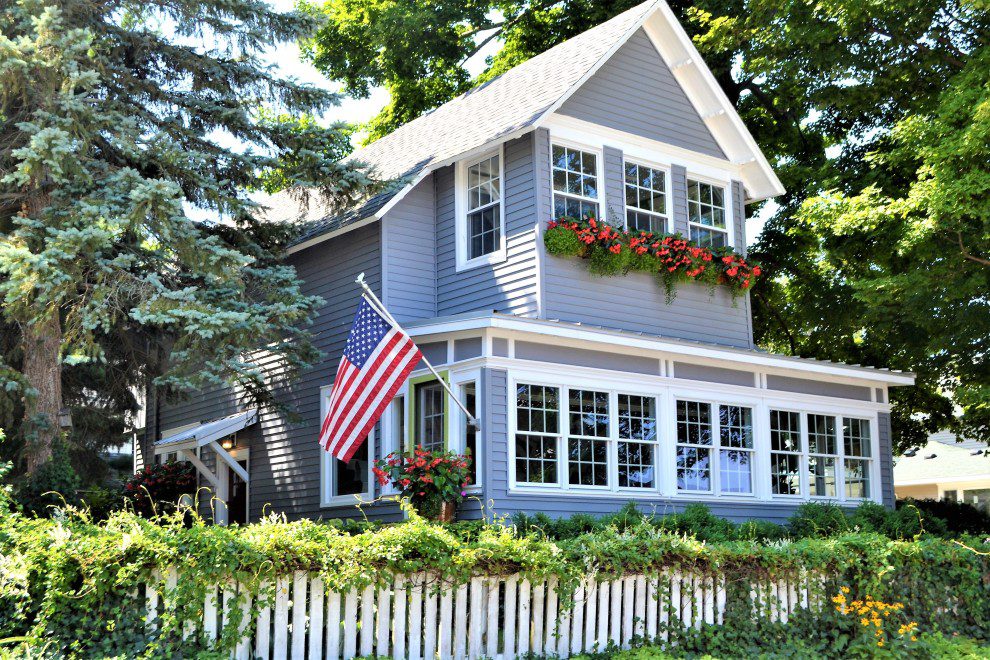
Taxation based on the ownership of property has been implemented since ancient times. The concept of modern taxes comes from British and European landlords and landowners.
In the fourteenth and fifteenth centuries, a taxpayer's ability to pay was determined by ownership and or the property's occupancy.
In due time, property taxes were eventually regarded on the physical property itself and not ownership or occupancy. The United Kingdom developed a system of rates based on the property's annual value.
The growth of property taxes closely relates to economic and political conditions to come.
Property taxes were a good source of revenue for local governments in pre-commercial agricultural areas. As the Revolutionary War approached, the colonies had a tax system that made war against the world's leading military power impossible.
How taxes were structured varied from colony to colony.
Several types of taxes existed at this time: capitation taxes, property taxes, faculty taxes, and tariffs on imported or exported goods and services.
During the colonial war, taxes were increased. Settlers who lived far away from local markets became angry that they were being taxed on a per-acre basis and not on the property's value.
Light land taxes and heavy poll taxes favored landowners in southern colonies. By the end of the 1800s, thirty-three states changed their tax system to tax based on value, not per acre.
The thirty-three states that changed their system are included in the following list:
1. Illinois
2. Tennessee
3. Missouri
4. Arkansas
5. Florida
6. Lousiana
7. Texas
8. Wisconsin
9. California
10. Michigan
11. Virginia
12. Ohio
13. Minnesota
14. Kansas
15. Oregon
16. West Virginia
17. Nevada
18. South Carolina
19. Georgia
20. North Carolina
21. Mississippi
22. Maine
23. Nebraska
24. New Jersey
25. Montana
26. North Dakota
27. Washington
28. Utah
29. Idaho
30. Kentucky
31. Wyoming
32. Washington
33. South Dakota
The appeal of uniformity politically in states west of the Appalachians was powerful. The uniform tax on all wealth was appealing to settlers supporting the Jacksonian ideas of equality.
The general property tax applied to all wealth with no exemptions.
This new general property tax was administered by local officials elected to determine the property's market value, figure out the taxes necessary to raise the amount levied, collect the taxes, and send it to the government.
Due to the reforms on the taxation system, the taxpayer would pay for the services they enjoyed the most in proportion to their wealth.
The United States developed the tax and administration system the way it did to bring in revenue for the local government.
States usually divided themselves into counties, each responsible for administering laws. Citizens of states could organize municipalities, school districts, and many other societal organizations.
The result was a large number of overlapping governments got formed, many of them in rural areas. Sales and income taxes did not bring enough revenue for the local governments, so the taxes people paid on property helped alleviate this issue.
Fun Fact: After 1066, William the Conqueror created an early form of land taxation.
We have covered a lot in this article. Hopefully, you have a better understanding of how property taxes are calculated and why we pay them.
It is essential that as a future or current homeowner or property owner, you understand these things. Failure can result in a world of financial hurt.
If you cannot pay your property taxes, don't panic. There is a way and many options to prevent the chaos and economic disaster that can come from not being able to pay your property taxes.
Also, as a home/property owner, it is essential to know how and when to pay your property taxes and see that you could deal with an increase in the amount you pay annually for property taxes due to various reasons.
Homeownership can be scary if you do not know what you are getting into, especially when dealing with property taxes. If you are a first-time buyer, it is advisable to seek the help of a financial professional to ensure that you do not make a fatal mistake that can put you in financial ruin.
Moving to a new place is not only difficult and expensive but also very time-consuming and risky. Whether you're getting ready to own a new house or you're relocating to a new home because of work, school, or any reason, there'10 Most Affordable Places To Live In Alabama For 2020s a lot that needs to be planned before moving day.
Before the big day comes, you need to make a myriad of moving preparations and plan the process.
You can't complete the move over a weekend (unless you're moving locally)“ loading your belongings on the moving truck and transporting them to your final destination may take up to one or two weeks, depending on the relocation distance.
So, how long does this whole moving process take? In this article, we're going to answer some common frequently asked questions associated with the amount of time it may take for you to find a new house and move into it.
The average time it will take you to find the perfect house for you may vary from a couple of days to a couple of months. In cases where youÃ're moving further away (50-60 miles or more from your current location), you may need some additional time to try and figure out which house will be best for you and your family.
You will also need to take some time to research the area so that you can determine which neighborhoods, schools, and other local entities may be best for you to live in or near.
The majority of the people are looking for a house during a period of time of 3 to 5 weeks, this gives them plenty of time in which they can research the area and it allows for more houses to get on the market, as well.
Obviously, not everyone falls into that time frame. And in some cases, individuals may need to move a lot more quickly, and they may be able to find the right house within a shorter time frame if necessary.
But, if you have the time to do so, be sure that you really look around and find a house that you like. Don't settle on something just because you're tired of looking around for a house.
If you want to just settle on something, you are likely going to be in a position where you want to move out within a couple of years.
The short answer it takes 65-70 days to sell an average house. However, this is the median timeline for selling homes and the sales timeline will widely fluctuate from market to market.
While looking for a new house, you will need to arrange to sell your previous house it will take a couple of weeks to stage the house for sale and get a few valuations, then there will be viewings and negotiations with potential buyers and various other details that need to be taken care of.
The entire process usually takes about one or two months, but it may be much longer, depending on the type of your property, the price you request, and its location.
If you're moving out from a rented property, you will need to review the conditions for ending your lease agreement and notify your landlord about your move a month in advance.
The short answer is 2 weeks, however, it depends on different financial factors.
If you're applying for a mortgage on the property, keep in mind that on average it may take 2 weeks but it also can take at least 3 to 4 weeks to get mortgage approval.
You'll need about 10 weeks to complete the transfer of your ownership (making the offer, completing the conveyancing process, closing the deal, and getting a house survey report).
If you're looking for a rental, the process will be much faster and easier once you've found the right place to move into, signing the lease contract will only take about a week (until your future landlord agreed upon the details of the lease and performs a background check on you).
Quick Recap: Generally it takes about 6 months to find and purchase a house, from start to finish. On average a buyer needs 10-12 weeks to find the right property, and between 18 and 40 days to get accepted for a mortgage.
How to Find a Good Moving Company
Total Time: 5 days
You first need to research your options, get recommendations, and look through a Google search. Prepare a list of potential moving companies. A list of 5-7 companies should be fine.
Check their reputations and online social proof. Read their reviews left by previous customers of the companies, review their websites, verify their USDOT numbers, and check their ratings with the BBB (Better Business Bureau)
Request an on-site quote from the top 3 companies from your list. Interview them, discuss the details of your move, and figure out their prices. Let them know what your expectations are.
By now you will have a good idea of who you would like to hire to complete your move. Now, it is time to call them and make the necessary arrangements.
Estimated Cost: 1250 USD
Tools:
Materials: Paper, Pen/Pencil
The better, the earlier you book the services of a trustworthy moving company, so it is advisable to do your own research and make your choice about 6 - 8 weeks before your desired moving date.
Or if you've decided on a self-move, you'll also need a few days to find an appropriate and affordable moving truck to rent and get all the necessary moving equipment.
You'll need to take care of a number of other moving tasks while scheduling your move. It will take about a month to put the necessary paperwork in order:
You need to allow some time to review and organize your papers, as well.
You will - need a couple of days to weeks to sort out and organize your belongings (depending on the size and capacity of your household).
This has to be done about 6-8 weeks prior to your actual move, so that you have enough time to sell or donate your no longer needed items that are still in good condition, to deal with the things you're not going to relocate and throw away any useless, worn out, or damaged ones.
Allow yourself a day or two to create a moving inventory of the items you want to take to your new house.
Your moving inventory list will help you to keep track of your possessions, will double as a packing list, and will serve as proof of the pre-move condition of your belongings should get damaged during the relocation.
Always keep in mind that it will take a lot of time to sell your unwanted items at a profit, you will have to list the items online or to organize a garage sale and arrange payment and delivery.
Hot Tip: If you want to get rid of your stuff fast then donate it to the Salvation Army. However, if you want to sell more valuable stuff then consider selling through Facebook's Marketplace.
The short answer is 25-30 hours to pack a two-bedroom house or apartment. However, each house is different in size and everybody has a different amount of belongings.
Packing a house for moving is laborious and many things can break--so be careful!
You need to have enough time to be safe and ensure the best possible protection to your items packing in a hurry may result in damage to your items and belongings as you won't have the time to take proper care of each and every item.
So, you should start packing as early as possible and spend a couple of hours a day on the task so that you can ensure the safety of your belongings.
Good to keep in mind that packing the storage areas in your home basement, garage, attic, etc., will require more effort and time than packing a standard room, so deal with them first while you have still plenty of time and energy.
Also, make sure that you have all the packing supplies on hand so you don't have to run back and forth to stores. The appropriate moving supplies are:
We have mentioned how long it would take to pack a two-bedroom house or apartment. Here are the estimated times for other types of situations (assuming that you are packing by yourself):
If you hire professional packers, they will complete the task in about:
The short answer is a few hours.
However, the average time it will take to load your belongings on the moving truck depends on several factors.
If you are well prepared and no unforeseen obstacles occur, a team of four professional movers will load the moving truck in about:
Moving to across town, it will take only several hours a day to transport your items to your new house.
But if you're moving across the country, however, the delivery may take several days or may take even a week. The transportation time will depend on the weather conditions, on the traffic, and at the time of your move as well.
Regarding your own trip, you may arrive at your new house after several hours or several days (if you're moving a short distance or if you're flying to your new city, or if you're driving from coast to coast).
You will need a few days to arrange your new house or apartment and unpack your items but it may take you several months to really settle in and feel at home in your new place.
Always you can take advantage of some time-saving tricks if you're moving on short notice or if you're pressed for time.
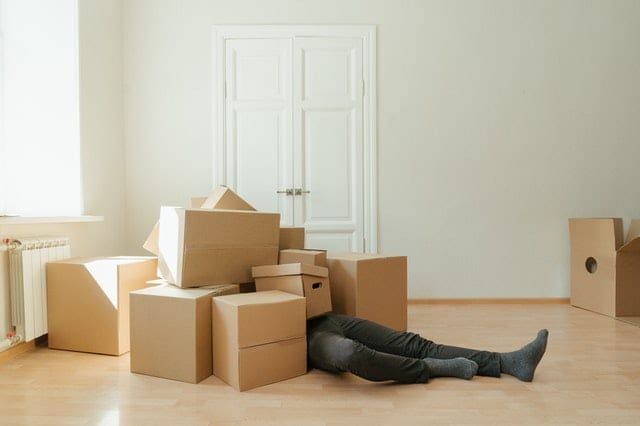
Yet, it is better to pay attention and take your time to every detail of your move this will ensure a smoother, safer, and stress-free relocation. If you are looking for affordable places to live in Alabama then check out our post.
If you think that the right insurance is enough from keeping you safe from a possible flood and the damage it can cause, we will explain why this is just not enough.
A flood wall is a wall that is built to be water from entering your property or your house. They are used to mitigate storm damage.
In this article, you will learn how to build a flood wall around your house step by step. This way, you can be prepared and keep your family safe.
Did you know that flooding is a common natural issue that happens in the USA? To reduce the risk of your house getting flooded, we will need just a little bit of free time, proper materials, and some energy for a heavy load of work. And, of course, some knowledge - which you can get right here.
The first thing you should know is that there are different ways to build a flood wall, and that depends on your choice. You can choose from pre-constructed flood walls that require little installation. And, of course, you can do it all from scratch.
Before we start with this entire process, let's see what statistics related to floods look like.
Statistics definitely look frightening. Yet, keep in mind that many things can be prevented. Therefore, we have prepared a long and well-researched article that will help you understand everything related to flood protection.
First, let's talk about those emergency situations where the flood has already occurred. Is there something you can still do?
Yes, there is! Bookmark this article so you always have it in case of an emergency.
We haven't mentioned that sometimes you will find yourself in an emergency situation where you'll need to build a flood barrier as soon as possible. For that purpose, you will have no other option than to use the dirt you have in the backyard.
The second thing - think of your property's terrain topography. It is very important to consider the entire yard's expanse because this way you'll be capable of routing the flood in the proper way.
The most important advice here is to leave enough space between your beloved house and the barrier you're making.
How to build an earthen levee?
Total Time: 1 day
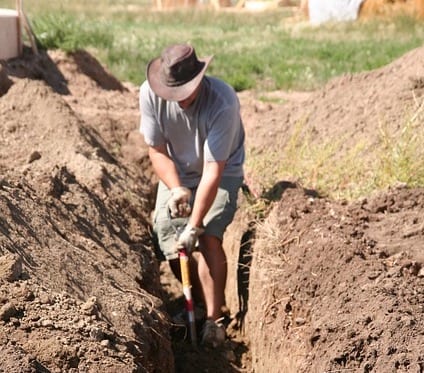
Don't just pile up dirt because building a trench first will provide a sturdy base. You will have to dig a two-foot trench in the place where your levee will be.
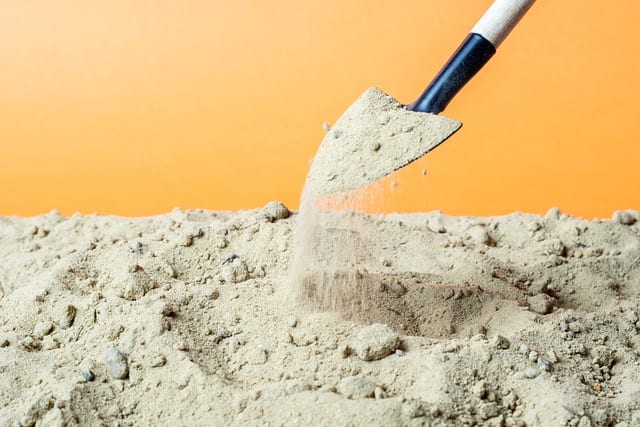
Fill in your base with sand in rock. By using denser materials such as rocks you can be certain that your foundation is less likely to be swept away by the flood.
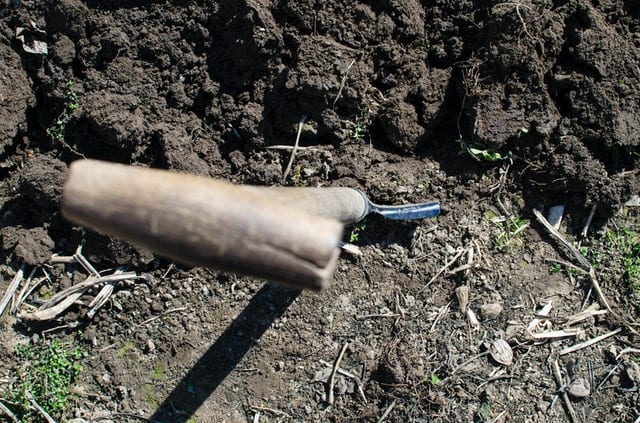
Use the dirt from the trench to start building a mound. Add layers and pack each layer down. With the help of your wheelbarrow, you can grab extra dirt from areas that you see fit to take from. Build your wall as high as you expect you need to.
Sufficient compaction is key. Heavy machinery will definitely make this task easier, but if you don't possess any - use your own hands, feet, and shovel blade. Constructing a flat levee is possible if you make it three times wide as its height.
Okay, we're almost finished, cover your barrier wall with plastic. This will make it more resistant to the weather.
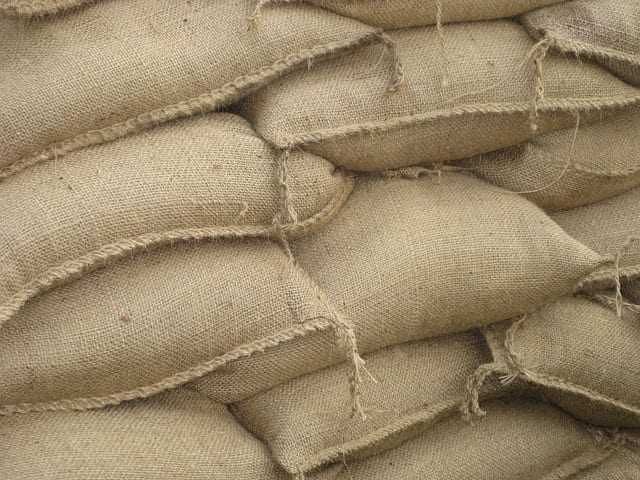
Supply:
Tools:
Materials: Dirt, sand, rocks from your backyard and plastic sheeting
But, what if you don't want to wait for the flood to appear? What if your idea is building this wall as insurance against natural disasters? Amazing! We're happy to hear that!
For that purpose, people use self-rising floodwalls. Here are the best options on the market that can help you stay prepared against floods:
1. Water-activated flood barrier. These incredible flood walls are capable to increase their height within just a few minutes. You can expect to get 3.5 inches high barrier whenever water arrives.
It can be used either alone or combined with other wall-related products against flood. You can find a water-activated flood barrier from 5-foot to even 17-foot in length.
2. Pre-constructed flood bags. When facing the water, these can also raise in height and length, protecting your property. People claim that Quick Dam Flood Bags are the best for this purpose. Super simple to install yet very effective.
3. Self-rising water gate floodwalls. This is the premium solution for floodwalls. They are expensive but if you live in an at-risk area they can easily pay themselves off.
Certainly, there are. We will represent to you all other possibilities you can use to keep your family safe from natural disasters. Here is what else you can do:
1. A waterproof veneer Adding this to your exterior walls will definitely add a bonus layer of safety.
2. Flood-resistant materials. When it comes to building your interior, it is always a good idea to use flood-resistant materials. Those are capable to stop water from retaining for up to 72 hours.
3. Think about your fuel tanks. Be sure to secure these if you don't want to have big issues. It is always best to anchor them down.
4. Back-flow valves. Are sewage backups your worry? It's always a great idea to install back-flow valves.
Now we have learned a lot about protecting your home from floods and building different sorts of flood protection, it's a good idea to hear what people worldwide do about this problem.
If your home is located near a river or sea, it's a great idea to be sure that your house is above the water levels. Obvious and the oldest solution is - elevation!
Building your own house on stilts is known within many traditions and cultures, but you can also build your home on a raised platform. Beach houses usually look this way, and you must admit - they're simply gorgeous!
Are you ready to build that floodwall from scratch, or are you thinking about buying some of the newest and easiest versions of it?
It doesn't matter what your choice is, the most important thing is to keep your home and family safe from this natural disaster.